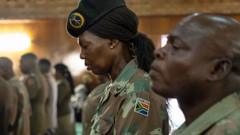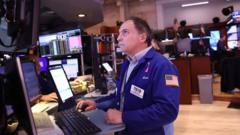The Vatican has extended its agreement with China regarding the appointment of bishops, marking an ongoing effort to foster relations while navigating issues of religious freedom.
Vatican Renews Controversial Bishop Deal with China

Vatican Renews Controversial Bishop Deal with China
Historic agreement continues as Vatican seeks to balance authority and relations amid human rights concerns.
In a surprising turn of events, the Vatican announced on Thursday that it had renewed its controversial agreement with Beijing concerning the appointment of bishops in China, a deal originally struck in 2018 aimed at resolving longstanding disputes. The extension, which lasts for two additional years, follows Secretary of State Mike Pompeo's recent attempt to persuade Vatican officials to abandon the agreement during his visit.
The deal, which has ignited debate about religious liberty and human rights within China, explicitly acknowledges the pope’s authority over Chinese bishops and requires that their appointments be recognized by the Vatican. In return, the Catholic Church has accepted the legitimacy of bishops previously appointed by the Chinese government, some of whom had faced excommunication from the Church.
"The Holy See considers the initial application of the Agreement — which is of great ecclesial and pastoral value — to have been positive, thanks to good communication and cooperation between the parties involved," the Vatican stated. Furthermore, officials emphasized their commitment to ongoing dialogue for the benefit of Chinese Catholics and the broader population.
Experts believe this agreement is a significant step toward potentially establishing full diplomatic relations with Beijing, a move that raises questions about the Vatican's longstanding alliance with Taiwan. However, critics of Pope Francis express concern over the lack of transparency surrounding the deal's details, which have not been disclosed to the public.
As the Vatican proceeds with this delicate balancing act, the implications for religious freedom in China and the future of Catholicism in the country remain to be seen. The interplay between Vatican authority and Chinese governmental control continues to evolve, highlighting the complexities of international religious relations in the current geopolitical landscape.
The deal, which has ignited debate about religious liberty and human rights within China, explicitly acknowledges the pope’s authority over Chinese bishops and requires that their appointments be recognized by the Vatican. In return, the Catholic Church has accepted the legitimacy of bishops previously appointed by the Chinese government, some of whom had faced excommunication from the Church.
"The Holy See considers the initial application of the Agreement — which is of great ecclesial and pastoral value — to have been positive, thanks to good communication and cooperation between the parties involved," the Vatican stated. Furthermore, officials emphasized their commitment to ongoing dialogue for the benefit of Chinese Catholics and the broader population.
Experts believe this agreement is a significant step toward potentially establishing full diplomatic relations with Beijing, a move that raises questions about the Vatican's longstanding alliance with Taiwan. However, critics of Pope Francis express concern over the lack of transparency surrounding the deal's details, which have not been disclosed to the public.
As the Vatican proceeds with this delicate balancing act, the implications for religious freedom in China and the future of Catholicism in the country remain to be seen. The interplay between Vatican authority and Chinese governmental control continues to evolve, highlighting the complexities of international religious relations in the current geopolitical landscape.






















